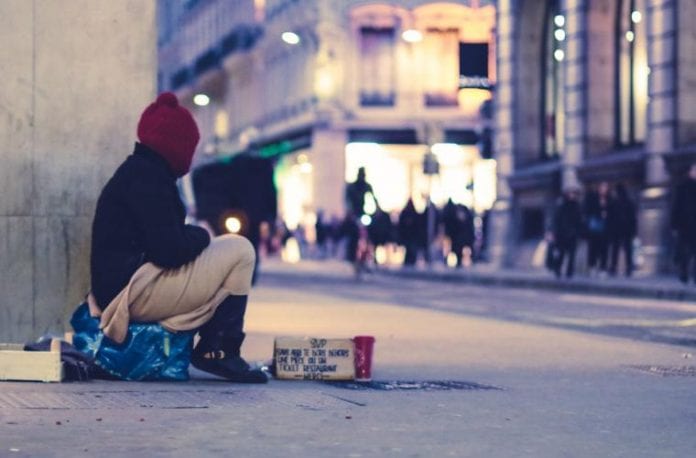New campaign launched calling for Welsh political parties to commit to changing the law so no one is left out from homelessness support
Embargoed report: https://www.crisis.org.uk/media/244820/no_one_left_out_report_2021_english-welsh.pdf
Current homelessness legislation in Wales is leaving people stuck in a cycle of homelessness for longer, pushed further from support and more likely to experience multiple forms of homelessness because of legal tests meaning they cannot access vital assistance from local councils, according to new research.
The No One Left Out report, published today by national homelessness charity Crisis, shows that since 2015 one in 8 people (9,261) who went to their local council for help to end their homelessness were unable to access further support. In the last year alone, this meant 1,773 people remained homeless[1].
The report highlights how detrimental the impact of being refused support can be. Not only can it mean that people can be forced to become homeless in the first place before seeking help, but they can be pushed further from support, stuck in a cycle of homelessness, with issues such as debt, mental health and substance misuse exacerbated. Sadly, the average age of death for people experiencing homelessness is 46 for men, and 43 for women[2], and Crisis research shows that people who are forced to sleep rough are almost 17 times more likely to be victims of violence[3].
The Housing (Wales) Act 2014 was a landmark piece of legislation which placed a legal duty on councils to prevent homelessness from happening in the first place and to help people out of it when it does. Since the legislation was introduced, it has seen huge success with 66% households being prevented from becoming homeless and 42% having their homelessness relieved[4].
But Crisis’ new research shows that the Act does not work for everyone. Where efforts to prevent or relieve someone’s homelessness are not successful, their homelessness is often prolonged because of the tests they must pass before they can access support. These tests include whether someone falls within a ‘priority need’ category, such as whether someone has dependent children, whether someone has a connection to the local area and whether they can prove they have not become homeless intentionally.
The report also highlights how resource intensive the tests are in nature for local authorities, due to being often complex and time consuming, as well as highlighting inconsistencies in the application of the tests across different areas in Wales, especially in areas with high demand.
Since 2015, the number of people approaching their local authority who were found to be threatened with homelessness or experiencing homelessness has increased year on year, with the number of households threatened by homelessness increasing by 40% and the number of households facing homelessness increasing by 80%[5]. Yet, a significant number of people have been left without the help they need because they do not pass the legal tests.
The study also found that the emergency response to the coronavirus pandemic has given local authorities renewed hope that ending homelessness is possible across Wales, as they’d been able to help people who would have otherwise been left out of support. The Welsh Government’s directive to help everyone experiencing homelessness to keep them safe during the outbreak saw over 7,000 people who were previously sleeping rough, provided with self-contained temporary accommodation and support last year.
Now, one year on from the introduction of the emergency measures, Crisis is calling for these and the success of the current legislation to be built on further. Today, the charity has launched it’s No One Left Out campaign urging political parties to commit to changing the law to remove current barriers to ensure that everyone facing homelessness in Wales can access vital support and make sure homelessness is ended in Wales.
Veteran Pawl*, 38, had been experiencing homelessness for four years prior to the beginning of the pandemic. After leaving the army, and following a relationship break down, he was forced into homelessness and moved between sofa surfing and sleeping in a tent. When he approached his local council for support, he was told he didn’t qualify due a lack of local connection, despite living in the area since the age of seven.
Pawl said: “My family had maintained an address in my area and I’d used that as my residential address for the entire time I was in the army. So, I guess I didn’t pay council tax so that’s how I didn’t have a local connection. Because obviously in the army you pay a charge in lieu of council tax so I guess I didn’t register as a person, I don’t know. Being told you don’t belong to a place that you’ve lived for 30 years is pretty tough to listen to.
“Because the pandemic has started, they eventually gave me a place to stay in a B&B, but they kept saying that I had to leave. But with support, I managed to challenge the decision and I’ve since been able to move into somewhere more permanent, which is absolutely brilliant. Having a place to live has helped me think about the future and start working towards that now.”
Jon Sparkes, chief executive of Crisis, said: “The bold and decisive action taken as part of the emergency response over the last year has shown us exactly what is possible with political will. Now, we must not go back. We must see all parties commit to making sure that everyone will be able to access homelessness support.
“The current law in Wales has broken ground in ensuring that thousands of people have been prevented from losing their homes and helped back onto their feet quickly when homelessness has happened. But there are still hundreds of people left stuck in a cycle of homelessness for months, sometimes years, because of who they are, where they live or how they became homeless.
“While these legal tests remain in place, we cannot end homelessness completely in Wales. A change in legislation will be a strong, bold first step towards ensuring we can end homelessness for everyone in Wales.”
Help keep news FREE for our readers
Supporting your local community newspaper/online news outlet is crucial now more than ever. If you believe in independent journalism, then consider making a valuable contribution by making a one-time or monthly donation. We operate in rural areas where providing unbiased news can be challenging. Read More About Supporting The West Wales Chronicle
























